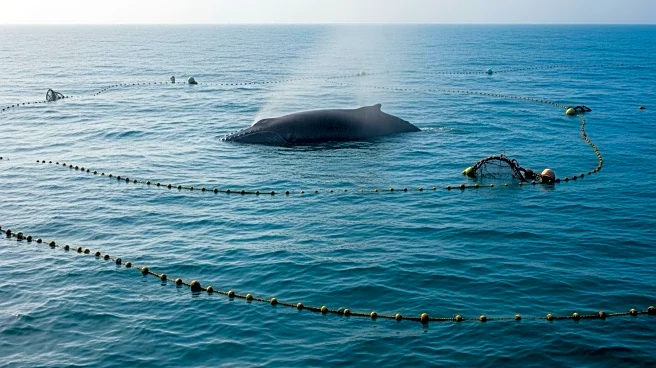What is the story about?
What's Happening?
Republican lawmakers are seeking to amend the Marine Mammal Protection Act, a pivotal environmental law established in 1972 to safeguard marine mammals such as whales, seals, and polar bears. The proposed changes aim to ease restrictions on commercial fishing and marine industries, which some argue are outdated and hinder economic activities. The bill, led by Republican Rep. Nick Begich of Alaska, suggests lowering population goals for marine mammals and redefining what constitutes harm to these animals. This move has garnered support from fishing groups and marine manufacturers who believe the current law imposes unnecessary constraints. However, conservationists warn that these changes could threaten endangered species like the North Atlantic right whale and Rice’s whale, which are already vulnerable due to entanglement in fishing gear and other hazards.
Why It's Important?
The proposed amendments to the Marine Mammal Protection Act could significantly impact both environmental conservation efforts and the fishing industry. For conservationists, the changes pose a risk to marine mammals, potentially reversing decades of progress in protecting endangered species. The North Atlantic right whale, with fewer than 400 individuals remaining, is particularly at risk. On the other hand, fishing groups argue that the current restrictions limit their operations and economic potential, especially in regions like Maine and Alaska where fishing is a key industry. The debate highlights the ongoing tension between environmental protection and economic interests, with potential implications for U.S. seafood imports and international trade regulations.
What's Next?
The bill is currently under consideration, with Republican Rep. Nick Begich advocating for a balance between marine mammal protection and economic interests. If passed, the amendments could lead to changes in how marine industries operate, particularly in areas with significant fishing activities. Conservation groups are expected to continue their opposition, emphasizing the need for science-based conservation measures. The outcome of this legislative effort could set a precedent for future environmental policies and regulations, influencing both domestic and international standards for marine conservation.
Beyond the Headlines
The proposed changes to the Marine Mammal Protection Act raise ethical and legal questions about the balance between conservation and economic development. The law has historically been a cornerstone of U.S. environmental policy, and its potential weakening could signal a shift in priorities. Additionally, the debate touches on cultural dimensions, as Indigenous groups have specific hunting rights under the current law. The broader implications of these changes could affect global perceptions of U.S. environmental leadership and its commitment to sustainable practices.














